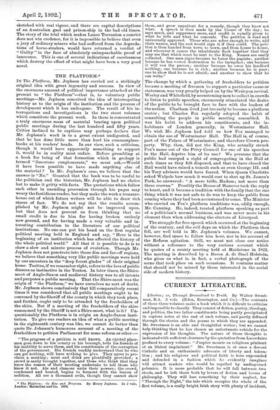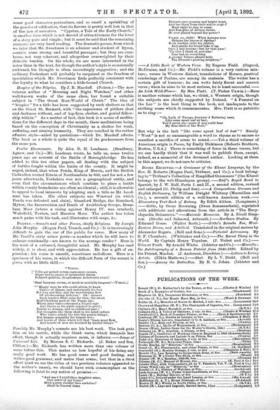CURRENT LITERATURE.
Libertas ; or, Through Dreamland to Truth. By Walter Sweet- man, B.A. 3 vols. (Eden, Remington, and Co.)—The contents of these three volumes make a book which it is difficult to criticise and impossible to classify. They consist of fiction, poetry, theology, and politics, the two latter constituents being partly precipitated in copious notes at the end of each volume, and partly diffused through the stories and the poems to which they are appended. Mr. Sweetman is an able and thoughtful writer ; but we cannot help thinking that he has chosen an unfortunate vehicle for the expression of his thoughts. The nature of those thoughts is indicated with sufficient clearness by the quotation from Lacordaire prefixed to every volume : " J'espere mourir en religienx pinitent et en lib4ral imp4Snitent." Mr. Sweetman is at once a devout Catholic and an enthusiastic advocate of liberty and tolera- tion; and his religious and political faith is here expounded and defended in a fashion which he evidently imagines will attract readers who would be repelled by undisguised polemics. It is more probable that he will fall between two stools, and be left there both by lovers of fiction and lovers of philosophy. They will lose something by their neglect, for "Through the Night," the tale which occupies the whole of the first volume, is a really bright Irish story with plenty of incident, some good character-portraiture, and so small a sprinkling of the powder of edification, that its flavour is pretty well lost in that of the jam of narrative. " Cyprian, a Tale of the Early Church," is another item which is not devoid of attractiveness for the lover of a story pure and simple; but it must be said that the remaining contents are very hard reading. The dramatic poems, from which we infer that Mr. Sweetman is an admirer and student of Byron, contain some strong and beautiful passages ; but they are cum- brous, not very coherent, and altogether overweighted by their didactic burden. On the whole, we are more interested in the notes than in the text, for though the author's style is occasionally awkward, his thought is often exceedingly suggestive ; and the ordinary Protestant will probably be surprised at the freedom of speculation which Mr. Sweetman finds perfectly consistent with due loyalty to what he considers a hide-bound Church.



































 Previous page
Previous page